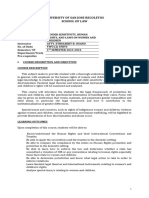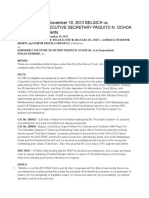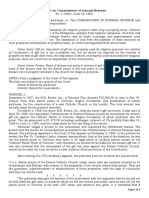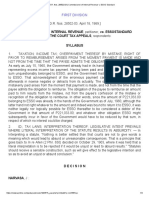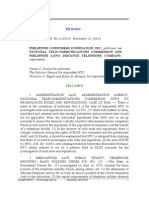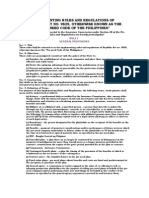Sec 28 - 3A - Garcia V Executive Secretary
Sec 28 - 3A - Garcia V Executive Secretary
Uploaded by
Maria Venus NegrosCopyright:
Available Formats
Sec 28 - 3A - Garcia V Executive Secretary
Sec 28 - 3A - Garcia V Executive Secretary
Uploaded by
Maria Venus NegrosOriginal Title
Copyright
Available Formats
Share this document
Did you find this document useful?
Is this content inappropriate?
Copyright:
Available Formats
Sec 28 - 3A - Garcia V Executive Secretary
Sec 28 - 3A - Garcia V Executive Secretary
Uploaded by
Maria Venus NegrosCopyright:
Available Formats
CONGRESSMAN ENRIQUE T.
GARCIA (Second District of Bataan), petitioner,
vs.
THE EXECUTIVE SECRETARY, THE COMMISSIONER OF CUSTOMS, THE NATIONAL
ECONOMIC AND DEVELOPMENT AUTHORITY, THE TARIFF COMMISSION, THE
SECRETARY OF FINANCE, and THE ENERGY REGULATORY BOARD, respondents.
G.R. No. 101273 | July 3, 1992
FACTS:
Executive Order No. 475 was issued by the President, on 15 August 1991, reducing the rate
of additional duty on all imported articles from nine percent (9%) to five percent (5%) ad
valorem, except in the cases of crude oil and other oil products which continued to be
subject to the additional duty of nine percent (9%) ad valorem. Seven (7) days later, the
President issued Executive Order No. 478, which levied a special duty of P0.95 per liter or
P151.05 per barrel of imported crude oil and P1.00 per liter of imported oil products. In the
present Petition for Certiorari, Prohibition and Mandamus, petitioner assails the validity of
Executive Orders No. 475 and 478 contending that since Section 24, Article VI of the 1987
Constitution vests the authority to enact revenue bills in Congress, the President may not
assume such power by issuing said Executive Orders which are in the nature of revenue-
generating measures. Petitioner further argues that Executive Orders No. 475 and 478
contravene Section 401 of the Tariff and Customs Code which authorized the President to
increase, reduce or remove tariff duties only when necessary to protect local industries or
products but not for the purpose of raising additional revenue for the government.
ISSUE:
Whether or not Executive Orders No. 475 and 478 are constitutional.
RULING:
Yes, the assailed Executive Orders are constitutional.
Section 28, Article VI of the Constitution provides that “the Congress may, by law, authorize
the President to fix within specified limits, and subject to such limitations and restrictions as
it may impose, tariff rates, import and export quotas, tonage and wharfage dues, and other
duties or imposts within the framework of the national development program of the
Government.”
In the present case, the enactment of appropriation, revenue and tariff bills, like all other
bills is, of course, within the province of the Legislative rather than the Executive
Department under Section 24, Article VI of the Constitution. It does not follow, however,
that Executive Orders No. 475 and 478, assuming they may be characterized as revenue
measures, are prohibited to the President. Furthermore, customs duties like internal
revenue taxes are designed to achieve more than one policy objective and the desire to
generate additional public revenues, are not, for that reason alone, either constitutionally
flawed, or legally infirm under Section 401 of the Tariff and Customs Code. Thus,
promulgating Executive Orders No. 475 and 478 is constitutionally permissible. Petitioner
has not successfully overcome the presumptions of constitutionality and legality to which
those Executive Orders are entitled
You might also like
- Outline For Legal ResearchDocument3 pagesOutline For Legal ResearchTurbonisNo ratings yet
- Gender Sensitivity, Human Rights, Laws On Women and Children's RightsDocument5 pagesGender Sensitivity, Human Rights, Laws On Women and Children's Rightskh7swwkgbvNo ratings yet
- CN53 - Eastern Shipping Lines Vs PoeaDocument3 pagesCN53 - Eastern Shipping Lines Vs PoeaKobe BryantNo ratings yet
- Philconsa Vs GimenezDocument1 pagePhilconsa Vs GimenezCarlota Nicolas VillaromanNo ratings yet
- Facts:: Facts: Commonwealth Act No. 567, Otherwise Known As Sugar Adjustment Act WasDocument2 pagesFacts:: Facts: Commonwealth Act No. 567, Otherwise Known As Sugar Adjustment Act WasRuiz Arenas AgacitaNo ratings yet
- Barangay ClearanceDocument28 pagesBarangay Clearancerosiedumas46No ratings yet
- Iloilo Palay and Corn Planters vs. Feliciano 13 SCRA 377Document6 pagesIloilo Palay and Corn Planters vs. Feliciano 13 SCRA 377Ry-Jaen CuarteroNo ratings yet
- G.R. No. 14129, July 31, 1962 People Vs ManantanDocument5 pagesG.R. No. 14129, July 31, 1962 People Vs ManantanJemard FelipeNo ratings yet
- Consti1 - Nicolas-Lewis V ComelecDocument2 pagesConsti1 - Nicolas-Lewis V ComelecJoanna ENo ratings yet
- Case 6 DigestDocument2 pagesCase 6 DigestChona CruzNo ratings yet
- National Power Corporation Vs AngasDocument2 pagesNational Power Corporation Vs AngasJairus Adrian VilbarNo ratings yet
- G.R. No. 208566 November 19, 2013 BELGICA vs. Honorable Executive Secretary Paquito N. Ochoa JR, Et Al, RespondentsDocument5 pagesG.R. No. 208566 November 19, 2013 BELGICA vs. Honorable Executive Secretary Paquito N. Ochoa JR, Et Al, Respondents1222No ratings yet
- NAVARRO V EXEC SECRETARYDocument7 pagesNAVARRO V EXEC SECRETARYDennis RivanoNo ratings yet
- Cases For Consti - PITC Vs Angeles GR 108461 (1996)Document2 pagesCases For Consti - PITC Vs Angeles GR 108461 (1996)Carly GraceNo ratings yet
- Cervantes vs. Auditor GeneralDocument3 pagesCervantes vs. Auditor GeneralDENR PAMBCSNo ratings yet
- Lladoc vs. Commissioner of Internal Revenue, 14 SCRA 292, No. L-19201 June 16, 1965Document3 pagesLladoc vs. Commissioner of Internal Revenue, 14 SCRA 292, No. L-19201 June 16, 1965PNP MayoyaoNo ratings yet
- BFAR Employees Union v. COA, G.R. No. 169815, August 13, 2008. Full TextDocument7 pagesBFAR Employees Union v. COA, G.R. No. 169815, August 13, 2008. Full TextRyuzaki HidekiNo ratings yet
- Statutory Construction ReviewerDocument33 pagesStatutory Construction ReviewerDaphne RodriguezNo ratings yet
- Galman PDFDocument3 pagesGalman PDFRaven Claire MalacaNo ratings yet
- Case 6 Demetria vs. Alba, 148 SCRA 208 (1987)Document6 pagesCase 6 Demetria vs. Alba, 148 SCRA 208 (1987)blude cosingNo ratings yet
- CIR v. ESSO Standard 1989Document4 pagesCIR v. ESSO Standard 1989Mark Ebenezer BernardoNo ratings yet
- 192 Scra 100 - Ordillo Vs ComelecDocument13 pages192 Scra 100 - Ordillo Vs ComelecracaliguirancoNo ratings yet
- The Truth Grace PoeDocument2 pagesThe Truth Grace PoeRommel Tottoc100% (1)
- Victoria's Milling Co., Inc. vs. Social Security Commission, 114 Phil. 555 (1962)Document2 pagesVictoria's Milling Co., Inc. vs. Social Security Commission, 114 Phil. 555 (1962)JoeyBoyCruzNo ratings yet
- IMBONG vs. COMELEC 35 SCRA 28 G.R No. L-32432, SEPTEMBER 11, 1970Document15 pagesIMBONG vs. COMELEC 35 SCRA 28 G.R No. L-32432, SEPTEMBER 11, 1970EriyunaNo ratings yet
- King vs. Hernaez, GR. L-14859Document16 pagesKing vs. Hernaez, GR. L-14859Tess TibayanNo ratings yet
- Article 2 Case Digests - UpdatedDocument134 pagesArticle 2 Case Digests - UpdatedJames GomezNo ratings yet
- NFL Vs EismaDocument1 pageNFL Vs EismaMavic MoralesNo ratings yet
- Tanada Vs Tuvera 136 SCRA 27Document2 pagesTanada Vs Tuvera 136 SCRA 27Michael ArciagaNo ratings yet
- Collector v. Campos RuedaDocument2 pagesCollector v. Campos RuedaAldrin Karl SeguradaNo ratings yet
- Labor Law Week 1 Case DigestsDocument107 pagesLabor Law Week 1 Case DigestsAprilNo ratings yet
- My Case Digest On 72873Document2 pagesMy Case Digest On 72873lawnotesnijanNo ratings yet
- CIR V TMX SalesDocument12 pagesCIR V TMX SalesJolo RomanNo ratings yet
- Facts: The Main Target of This Petition Is Section 35 ofDocument17 pagesFacts: The Main Target of This Petition Is Section 35 ofFrances Grace DamazoNo ratings yet
- G.R. No. 56350. April 2, 1981 Digest (B)Document1 pageG.R. No. 56350. April 2, 1981 Digest (B)Maritoni RoxasNo ratings yet
- Fidela Bengco Et. Al. Vs Atty Pablo S. Bernardo AC No 6368 June 13, 2012Document5 pagesFidela Bengco Et. Al. Vs Atty Pablo S. Bernardo AC No 6368 June 13, 2012BerniceAnneAseñas-ElmacoNo ratings yet
- PCFI V NTCDocument2 pagesPCFI V NTCPaula Katrina DizonNo ratings yet
- China Bank VDocument1 pageChina Bank VmfspongebobNo ratings yet
- Angara vs. Electoral CommissionDocument3 pagesAngara vs. Electoral CommissionMariano Acosta Landicho Jr.No ratings yet
- UP v. Hon. Dizon, G.R. No. 171182, August 23, 2010Document2 pagesUP v. Hon. Dizon, G.R. No. 171182, August 23, 2010KcompacionNo ratings yet
- Alexandria Condominium Corporation v. Laguna Lake Development AuthorityDocument6 pagesAlexandria Condominium Corporation v. Laguna Lake Development AuthorityMichael Derence PabalateNo ratings yet
- 63 First Lepanto Vs CA 237 SCRA 519Document3 pages63 First Lepanto Vs CA 237 SCRA 519Bennet BalberiaNo ratings yet
- G.R. No. 168056 September 1, 2005 - Abakada Guro Party List v. ErmitaDocument4 pagesG.R. No. 168056 September 1, 2005 - Abakada Guro Party List v. ErmitaGab EstiadaNo ratings yet
- Arroyo V de VeneciaDocument4 pagesArroyo V de VeneciaCarol AugustNo ratings yet
- Philippine National Bank, Petitioner, vs. Dan Padao, Respondent. A. G.R. No. 180849Document18 pagesPhilippine National Bank, Petitioner, vs. Dan Padao, Respondent. A. G.R. No. 180849amco88No ratings yet
- Case Digest No.2 5th AssignmentDocument3 pagesCase Digest No.2 5th Assignmentjeliena-malazarteNo ratings yet
- Finman General Assurance Corp. v. CADocument4 pagesFinman General Assurance Corp. v. CAVSBNo ratings yet
- 65) BUISAN V. COA, G.R. NO. 212376 (2017) Reyes, J.: TopicDocument1 page65) BUISAN V. COA, G.R. NO. 212376 (2017) Reyes, J.: TopicFretzie Cata-alNo ratings yet
- Intellectual Property Association of The Philippines v. Hon. OchoaDocument68 pagesIntellectual Property Association of The Philippines v. Hon. OchoaLaw SchoolNo ratings yet
- PCFI Vs NTC, 1983Document7 pagesPCFI Vs NTC, 1983Justin HarrisNo ratings yet
- Garcia v. Executive SecretaryDocument2 pagesGarcia v. Executive SecretaryERNIL L BAWANo ratings yet
- Dabalos v. Judge Paras-QuiambaoDocument2 pagesDabalos v. Judge Paras-QuiambaoJan Alaba100% (1)
- LYDIA O. CHUA, Petitioner, vs. THE CIVIL SERVICE COMMISSION, THE NATIONAL IRRIGATION ADMINISTRATION and THEDocument2 pagesLYDIA O. CHUA, Petitioner, vs. THE CIVIL SERVICE COMMISSION, THE NATIONAL IRRIGATION ADMINISTRATION and THEzacNo ratings yet
- Eastern Shipping Vs POEA 166 SCRA 533Document3 pagesEastern Shipping Vs POEA 166 SCRA 533Carmille Marge MercadoNo ratings yet
- La Suerte V CA - DigestDocument2 pagesLa Suerte V CA - DigestPolo MartinezNo ratings yet
- Isidro C. Ang - Angco, Petitioner, vs. Hon. Natalio P. Castillo, Et. Al., Respondents No. L-17169. November 30,1963 (9 SCRA 619)Document2 pagesIsidro C. Ang - Angco, Petitioner, vs. Hon. Natalio P. Castillo, Et. Al., Respondents No. L-17169. November 30,1963 (9 SCRA 619)Sheila Arenajo ArtilleroNo ratings yet
- Consti Cases Judicial DeptDocument3 pagesConsti Cases Judicial DeptDon YcayNo ratings yet
- 2 The City of Davao V RTC BranchDocument1 page2 The City of Davao V RTC BranchErnesto A. AmoraNo ratings yet
- Doctrine: Laws Should Be Resolved in Favor of Labor. X X X in Upholding The AssailedDocument2 pagesDoctrine: Laws Should Be Resolved in Favor of Labor. X X X in Upholding The AssailedRyan Paul AquinoNo ratings yet
- Garcia V Executive SecretaryDocument8 pagesGarcia V Executive Secretarycarla_cariaga_2No ratings yet
- 1 Garcia vs. Executive Secretary (GR No. 101273)Document7 pages1 Garcia vs. Executive Secretary (GR No. 101273)yra crisostomoNo ratings yet
- Enrique Garcia Vs Executive SecretaryDocument1 pageEnrique Garcia Vs Executive SecretaryEllen Glae Daquipil100% (1)
- Doctrine of Proximate CauseDocument4 pagesDoctrine of Proximate CauseGyan Prakash100% (1)
- Peralta GenosaDocument11 pagesPeralta GenosaDanielle Nicole ValerosNo ratings yet
- Tools of Criminal InvestigationDocument14 pagesTools of Criminal Investigationlian carla c. luzong100% (2)
- Contains Restricted Names : Forsyth County Sheriff'SDocument3 pagesContains Restricted Names : Forsyth County Sheriff'SChris CeNo ratings yet
- 1A. Case Digests. LPO. Part I. Intro ConceptsDocument18 pages1A. Case Digests. LPO. Part I. Intro ConceptsBuddy Brylle YbanezNo ratings yet
- Deed of Extrajudicial Settlement of EstateDocument8 pagesDeed of Extrajudicial Settlement of EstatePrescila MagpiliNo ratings yet
- PS Prods. v. Activision - MTD OppositionDocument20 pagesPS Prods. v. Activision - MTD OppositionSarah BursteinNo ratings yet
- Ghana Shipping Act, 2003 (Act 645) As Amended by Acts 675 and 826Document191 pagesGhana Shipping Act, 2003 (Act 645) As Amended by Acts 675 and 826ptnyagortey91No ratings yet
- PBL CriminalDocument11 pagesPBL CriminalKathir RavNo ratings yet
- Harika RavellaDocument6 pagesHarika RavellaAnu RadhaNo ratings yet
- Tutorial 4 JurisprudenceDocument3 pagesTutorial 4 JurisprudencePARVEENA KAUR A P BALDEB SINGHNo ratings yet
- Myanmar Foreign Investment LawDocument15 pagesMyanmar Foreign Investment LawAyeChan AungNo ratings yet
- CIEE H2B App 2009Document5 pagesCIEE H2B App 2009panggi_pratiwiNo ratings yet
- Con Ten Testing Realities Jessica Whyte AgambenDocument8 pagesCon Ten Testing Realities Jessica Whyte Agambenatrujillo9No ratings yet
- Page 1 of 15 Vincent Balentino T. Batadlan RcrimDocument15 pagesPage 1 of 15 Vincent Balentino T. Batadlan RcrimJomar100% (1)
- 2018 Annual ReportDocument24 pages2018 Annual ReportOhio Justice Policy CenterNo ratings yet
- Mathematics Grade 3 Eng - Work Book 2 T 3 & 4Document138 pagesMathematics Grade 3 Eng - Work Book 2 T 3 & 4Bare GroupNo ratings yet
- APC Final Assessment Application Form MENADocument8 pagesAPC Final Assessment Application Form MENAMohd RafidNo ratings yet
- Constitutional Law I: The ConstitutionDocument3 pagesConstitutional Law I: The ConstitutionEmNo ratings yet
- Ruchika CaseDocument2 pagesRuchika CaseSanaur RahmanNo ratings yet
- Pre-Need Code of The PhilippinesDocument23 pagesPre-Need Code of The PhilippinesCitadel Nicolas PennNo ratings yet
- Torts CasesDocument95 pagesTorts CasesJimi SolomonNo ratings yet
- ojsadmin,+UofG Footnotes 2015 V2-52-61Document10 pagesojsadmin,+UofG Footnotes 2015 V2-52-61kate buyuccanNo ratings yet
- Petitioner vs. vs. Respondents: Third DivisionDocument13 pagesPetitioner vs. vs. Respondents: Third DivisionVener MargalloNo ratings yet
- Fariya and Siddharth Marital Rape PaperDocument3 pagesFariya and Siddharth Marital Rape PaperSiddharth AnandNo ratings yet
- Cruz v. ParasDocument2 pagesCruz v. Parascsalipio24No ratings yet
- Disability Discrimination Act 1992: No. 135, 1992 As AmendedDocument82 pagesDisability Discrimination Act 1992: No. 135, 1992 As Amendedapi-351195320No ratings yet
- Commissioner of Internal Revenue vs. SM Prime Holdings, Inc., 613 SCRA 774, G.R. No. 183505 February 26, 2010Document21 pagesCommissioner of Internal Revenue vs. SM Prime Holdings, Inc., 613 SCRA 774, G.R. No. 183505 February 26, 2010Alexiss Mace JuradoNo ratings yet

